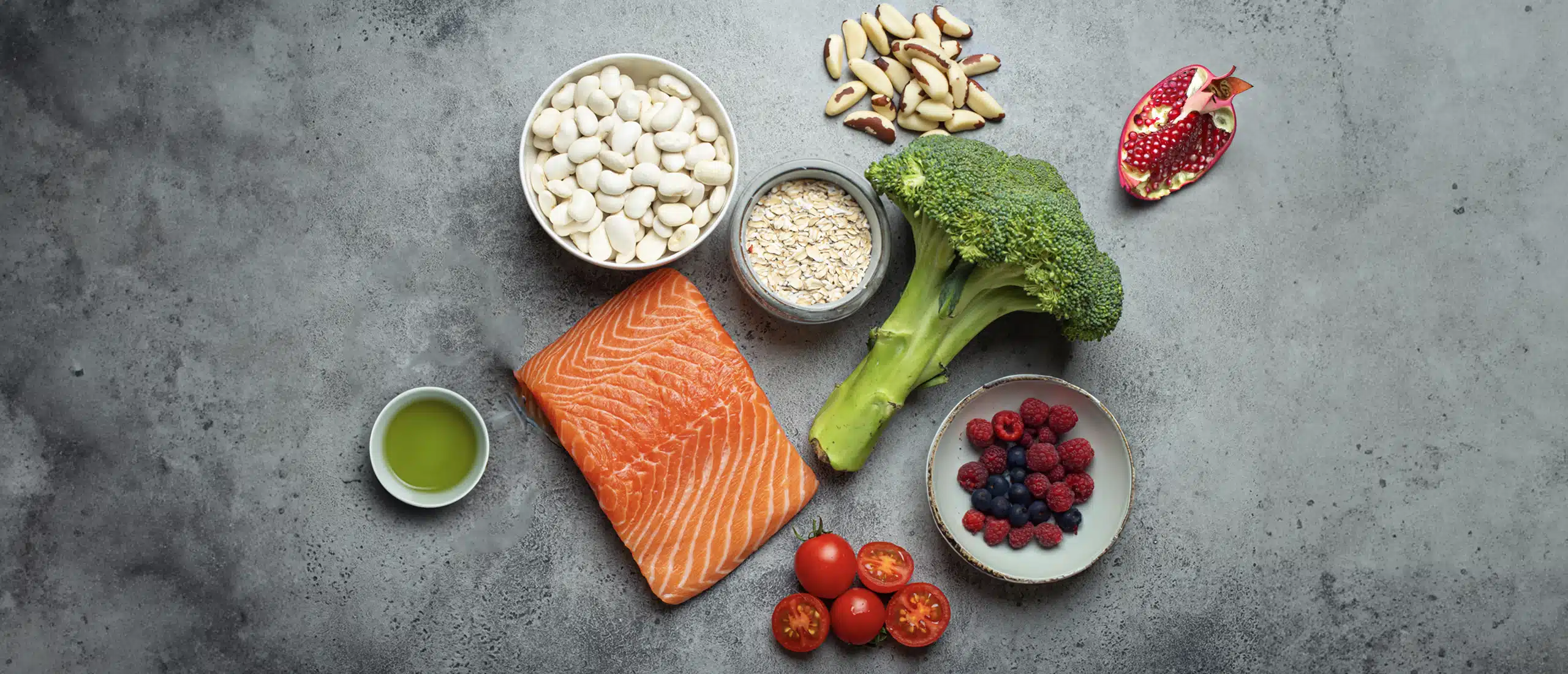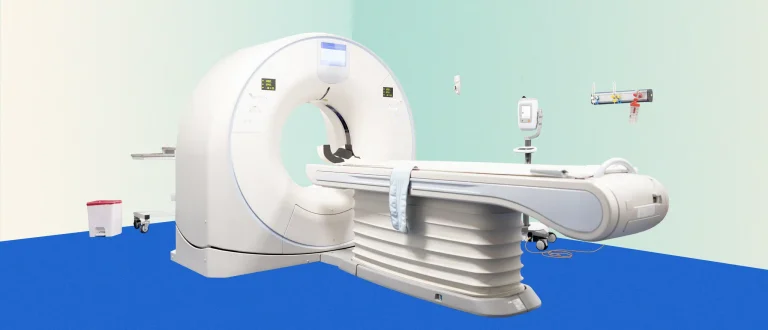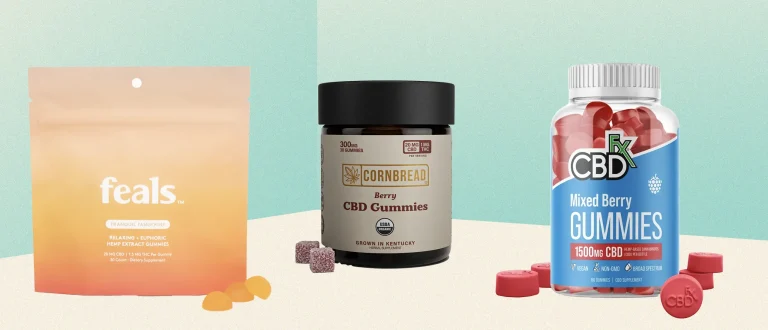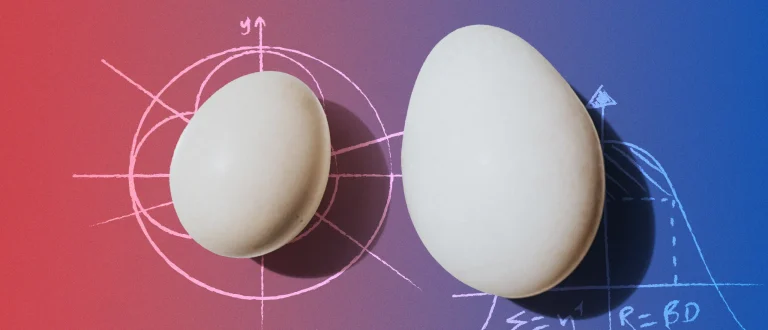30-Second Takeaway
- Chronic prostate conditions—like prostatitis, cancer, and enlargement—are becoming more common, in part due to high-fat Western diets.
- Healthy diets high in antioxidants and fiber may reduce your risk by reducing inflammation.
- Routine prostate exams may help detect cancer early, leading to a longer life.
Prostate conditions, including an enlarged prostate and prostate cancer are alarmingly common. As many as 1 in 8 men will be diagnosed with prostate cancer in their lifetime, per the American Cancer Society. More than half of men after age 50 will develop an enlarged prostate (or benign prostatic hyperplasia)—which can cause debilitating symptoms like difficult or painful urination (1).
One of the biggest culprits: “Western diets high in red meat and fats,” says urologist Omer Raheem, M.D. “Diet plays a role in inflammation, hormone regulation, and antioxidant defenses, all of which can influence prostate health.”
While prostate issues are more common in men over 50 (2), “it’s never too early to prioritize prostate health,” Raheem says. You can cut your risk of issues in the future by eating well in your 30s and 40s—and staying on top of routine prostate exams.
So, what foods help repair and protect the prostate?
About the Expert:
Omer Raheem, M.D., is a board-certified urologist specializing in men’s sexual health, male infertility, and andrology at the University of Chicago. He also holds a joint appointment as an assistant professor of Reproductive Endocrinology and Infertility at the University of Chicago.
10 Best Foods for Prostate Health
Tomatoes
Mediterranean diets—which are heavy in tomatoes and other colorful fruits and vegetables—are linked to lower prostate cancer risk, according to a 2023 study by the University of South Australia (3).
Here’s why: Tomatoes are a superfood that contain a powerful antioxidant called lycopene, Raheem notes, which has been linked to reduced prostate cancer risk. Men with lower blood plasma lycopene levels are more likely to develop prostate cancer (3).
In a 2017 meta-analysis, researchers found that for every 2 milligrams (mg) of lycopene men consumed daily, they experienced a 1 percent drop in their risk of developing prostate cancer (4). Doesn’t sound like much, but start your day with a glass of tomato juice and you’re getting a full 22mg.
Lycopene may reduce prostate-specific antigen (PSA) levels, a protein released by the prostate (5). High levels of PSA are linked to prostatitis, prostate cancer, and prostate enlargement.
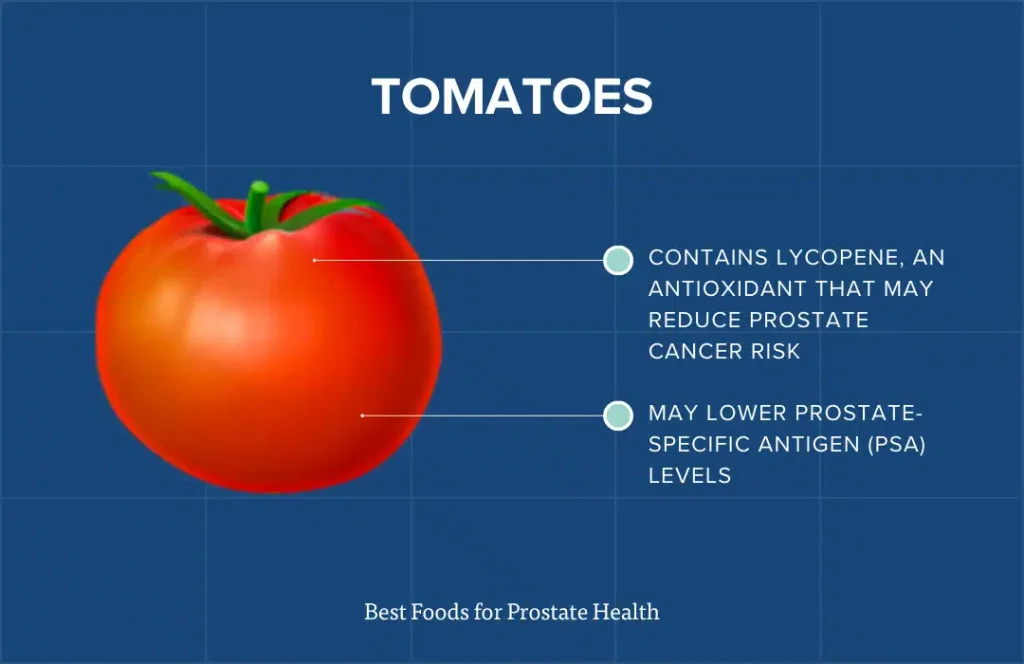
Broccoli
Cruciferous vegetables—like broccoli, brussel sprouts, bok choy, and cauliflower—contain a compound called sulforaphane, which may target cancer cells and promote a healthy prostate.
Researchers suspect that sulforaphane could stop prostate cancer from developing by disrupting the androgen receptor signaling pathway, which regulates androgens (male hormones) and prostate function (6). Excessively high or low androgen levels are linked with an increased prostate cancer risk (7).
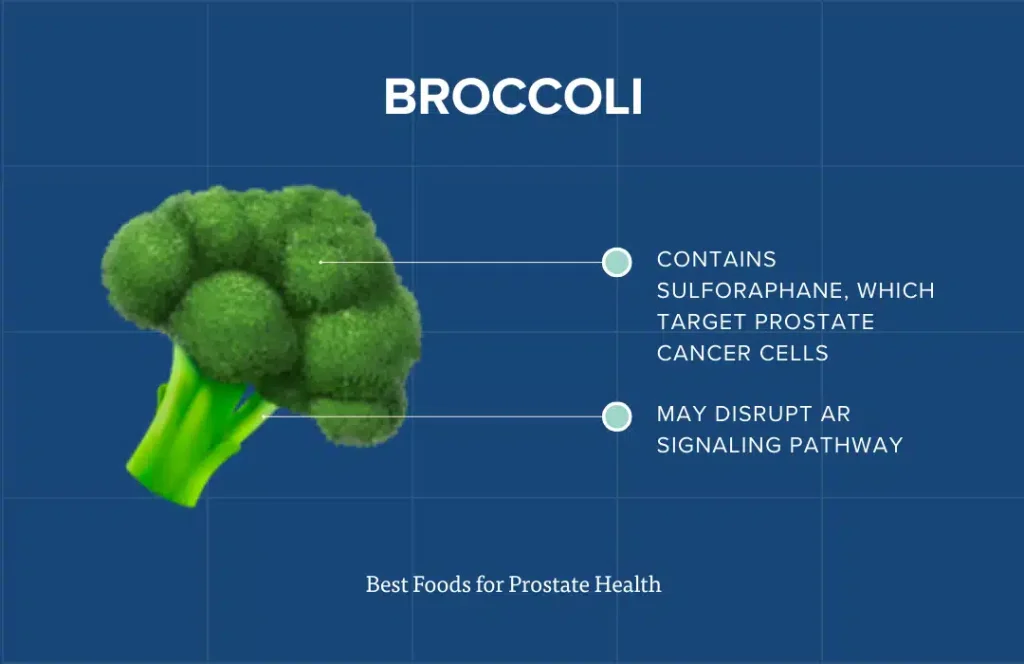
Fatty fish
Fatty fish like salmon, mackerel, and sardines are rich in omega-3 fatty acids, which have anti-inflammatory properties, Raheem explains.
Several studies have found that men who have diets high in fatty fish have reduced prostate cancer risk (8).
However, lean fish—like tilapia and halibut—may have the opposite effect if cooked at a high temperature by broiling, grilling, or pan-frying. A 2012 study found that men who ate two or more servings of white fish per week were twice as likely to develop prostate cancer compared to men who don’t eat fish (9). The study found no cancer risk when white fish was cooked using low-temperature methods like baking or boiling.
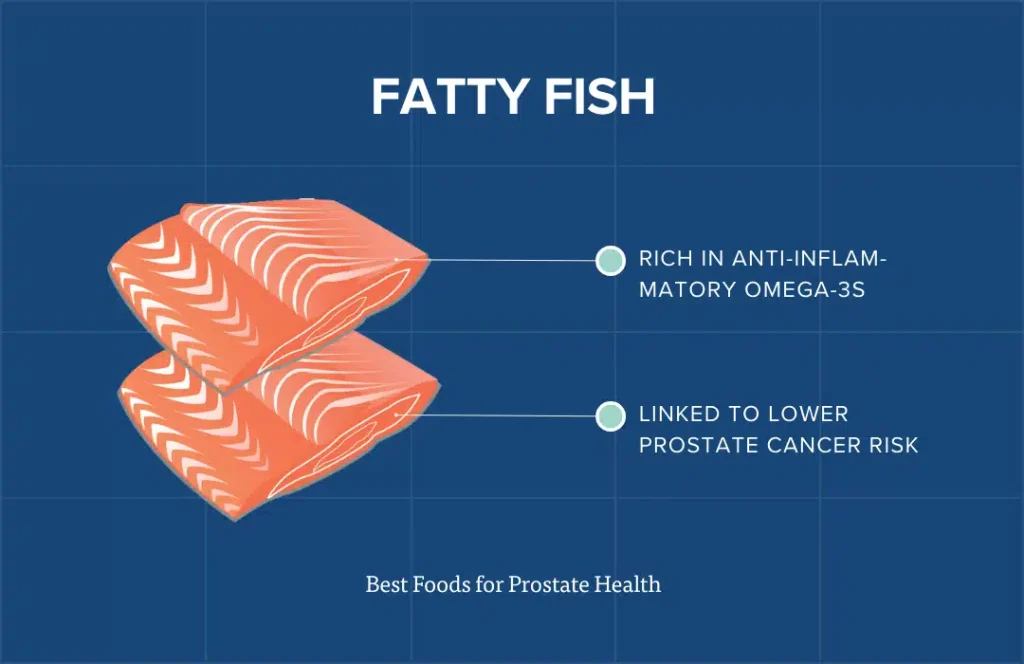
Preventative Health
Green tea
Green tea contains catechins, per Raheem, a type of antioxidants that may protect against prostate cancer (10). A large clinical trial in South China found that prostate cancer risk went down as men drank more cups of green tea (11).
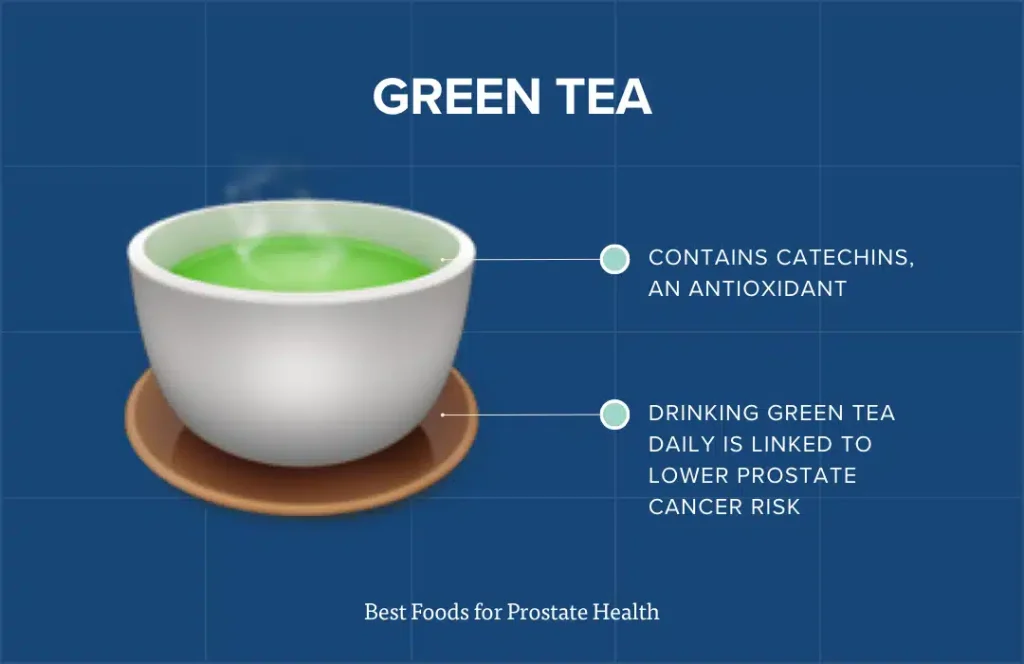
Brazil nuts
Brazil nuts are full of selenium, a mineral that may play a role in reducing the risk of prostate cancer. Selenium supports DNA synthesis and repair, immune function, and can reduce the toxicity of heavy metals—all of which contribute to cancer risk (12, 13).
Researchers at the University of South Australia found that men who have low selenium blood plasma levels may have higher prostate cancer risk (3).
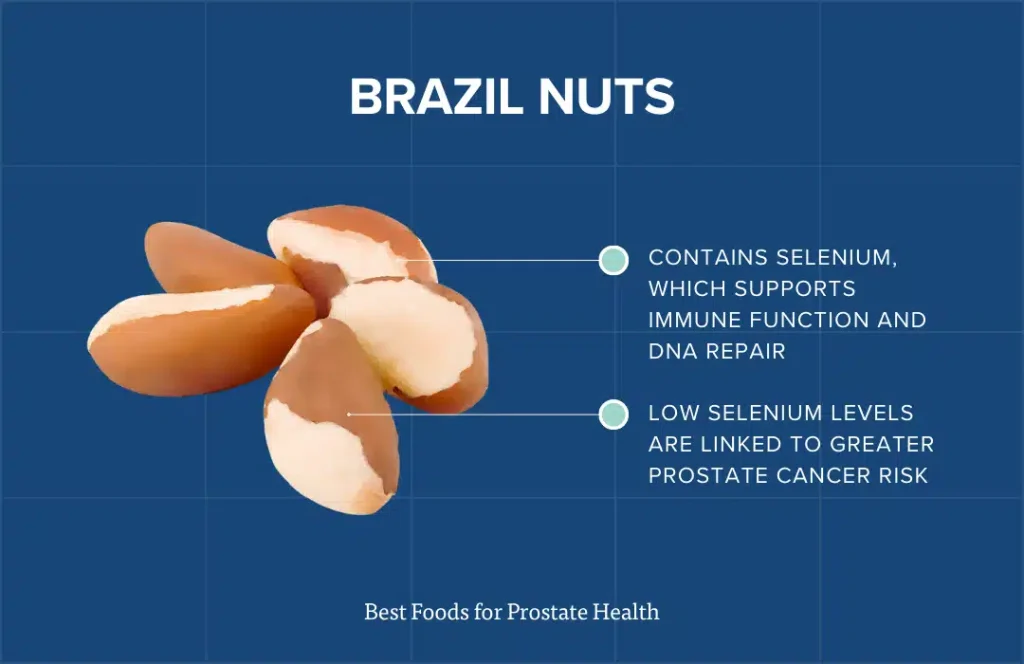
Berries
“Blueberries, strawberries, and raspberries contain antioxidants called flavonoids, which may slow prostate cancer growth,” Raheem says.
Flavonoids may reduce inflammation associated with prostate enlargement, according to a 2022 study (14).
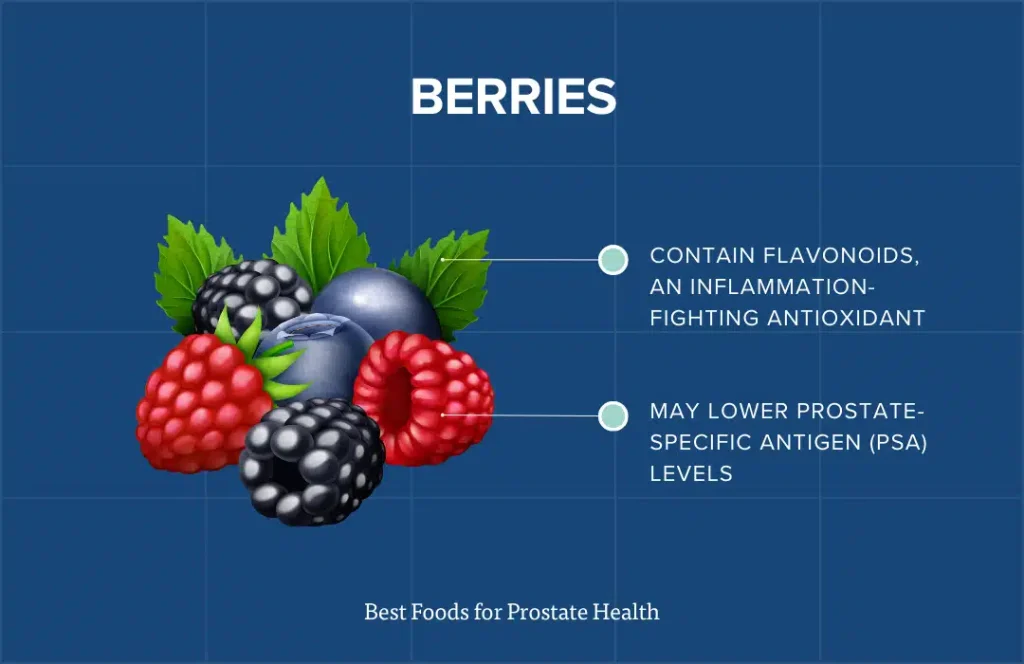
Pomegranate
Pomegranates are rich in antioxidants, according to Raheem, which can stave off the growth of cancer cells and reduce the risk of prostate cancer.
Several small clinical trials show that pomegranate juice may lengthen PSA doubling time—the rate at which PSA levels increase (15). Slowing the speed at which PSA levels increase has been associated with slower prostate cancer growth and better health outcomes for men who are diagnosed (16).
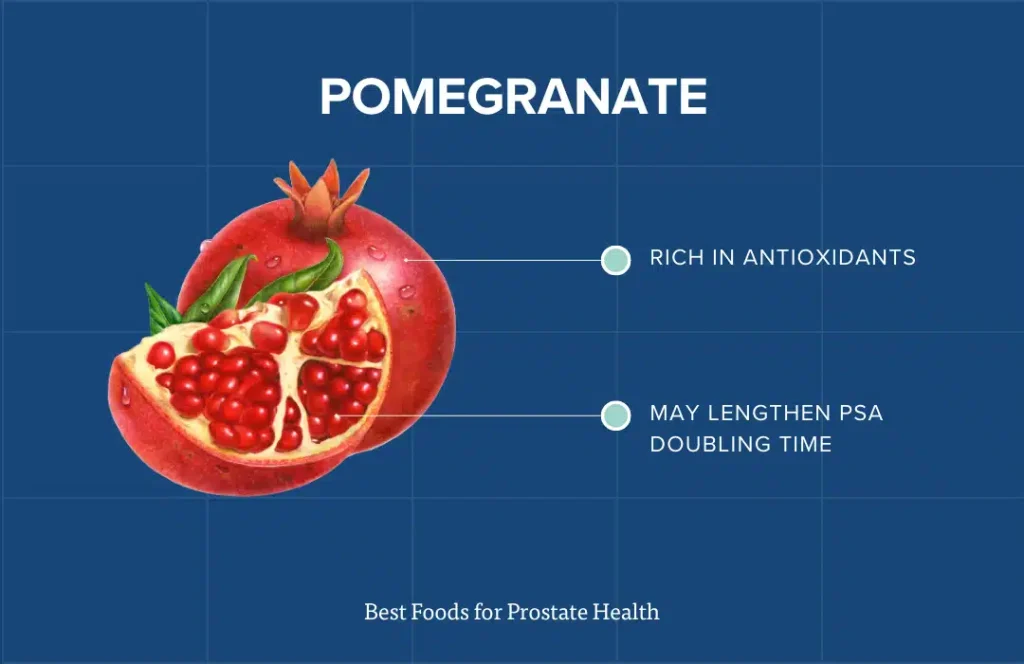
Citrus fruits
Only 12 percent of American adults meet the recommended daily fruit intake—and that rate is even lower amongst men. If you’re trying to reduce your risk of developing a chronic prostate condition, that’s a problem.
“Oranges, lemons, and grapefruits have vitamin C and other antioxidants that support the immune system and may help in guarding against prostate cancer,” Raheem says.
A 2017 study found that men in the upper fifth of citrus fruit consumption had significantly lower risk of developing prostate cancer (17). But this trend wasn’t observed amongst men who mainly eat fruits like apples, pears, and bananas. Researchers suspect this is because of the high vitamin C concentration in citrus.
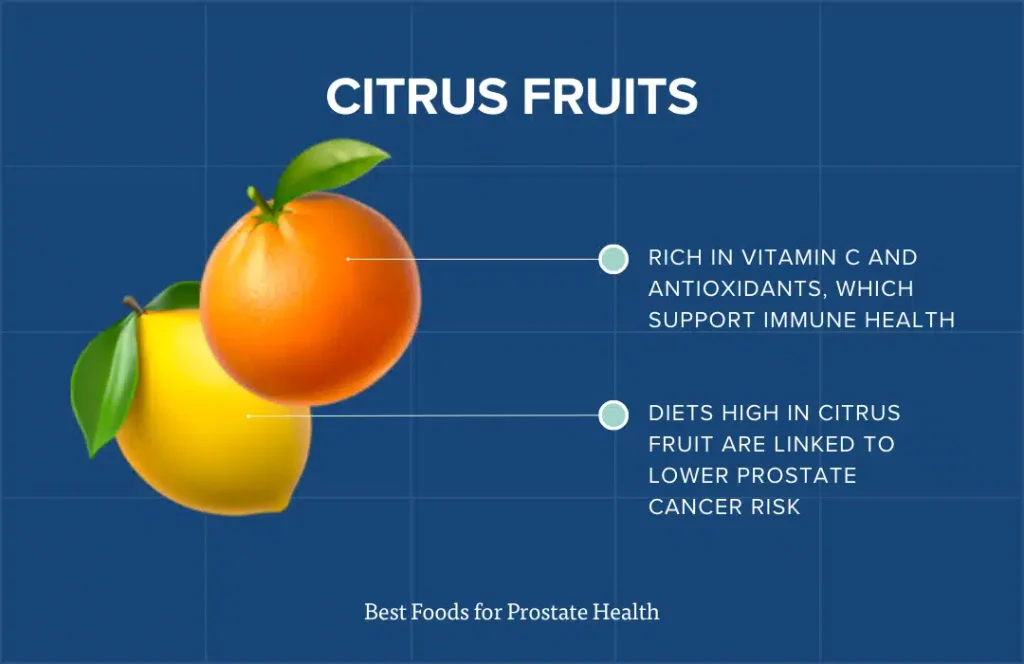
Whole grains
“Oats, barley, and quinoa are full of fiber, which can help maintain a healthy weight,” Raheem says. “And a healthy weight can lower the risk of prostate issues.”
High-fiber diets may improve symptoms of prostatitis (chronic prostate inflammation), such as constipation and painful bowel movements (18).
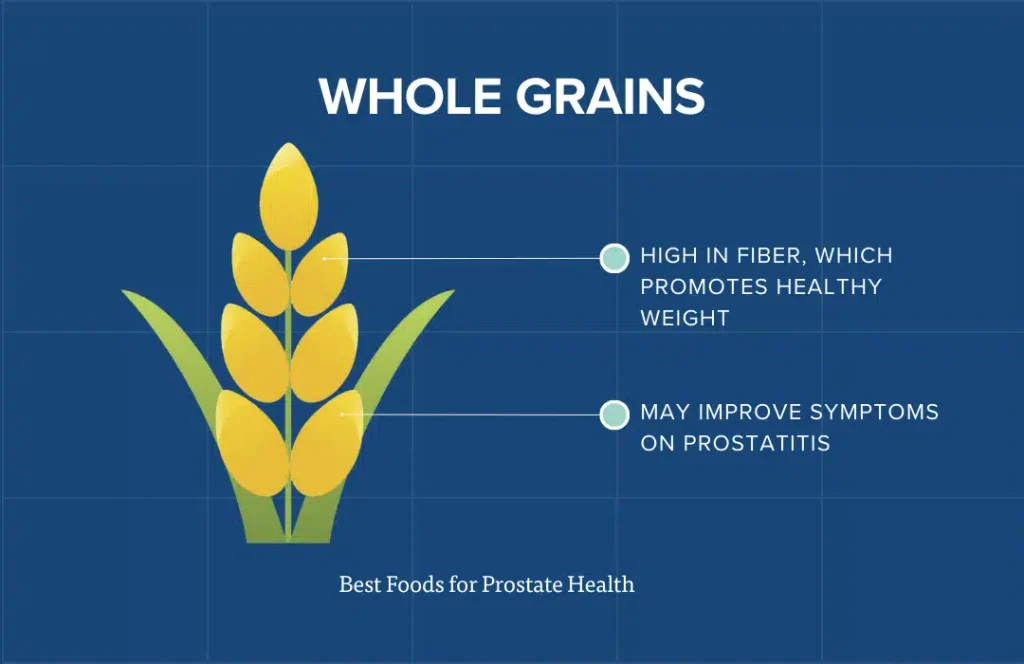
Legumes
“Legumes like lentils, chickpeas, and beans contain biologically active compounds like phytoestrogens that may help prevent prostate cancer,” Raheem says.
Eating more phytoestrogens—an estrogen found in plants—has been linked to greatly reduced prostate cancer risk across several studies, according to a 2015 meta-analysis (19). This may be due to phytoestrogens’ ability to balance androgens, hormones associated with prostate cancer risk.
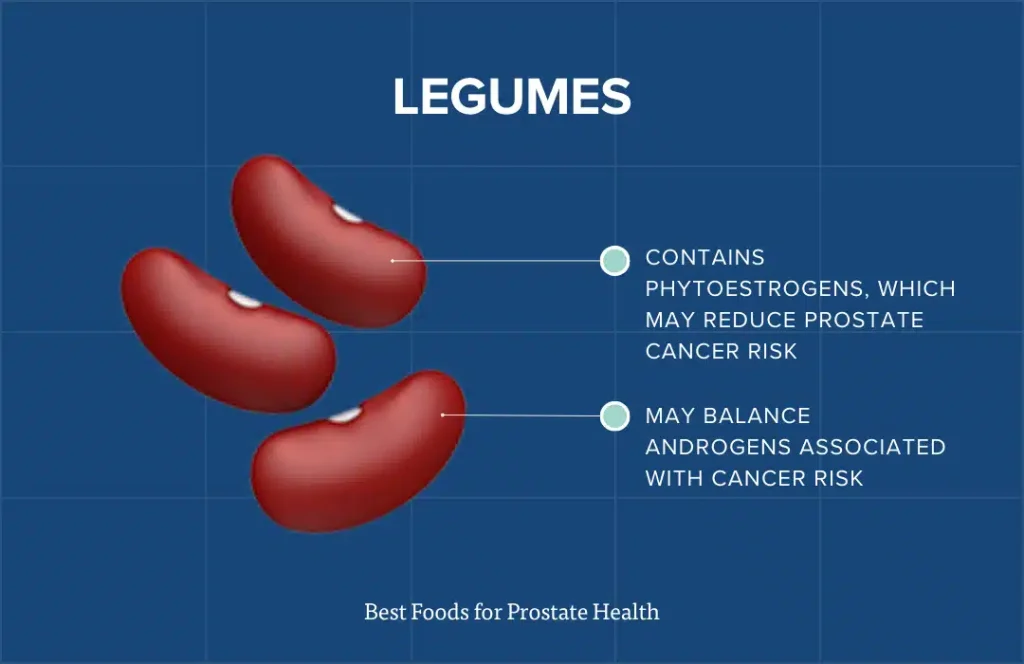
Worst Foods for Prostate Health
It’s not enough to eat prostate-healthy foods to reduce your risk of cancer, Raheem notes. You’ll also want to limit these foods, which may contribute to prostate issues:
- Red Meat: Frequent consumption is linked to an increased risk of prostate cancer (20).
- Dairy: High intake of dairy products has been associated with a slight increase in prostate cancer risk (21).
- Saturated Fats: Foods rich in saturated fats, like fried foods and certain baked goods, might increase prostate cancer risk (22).
- Alcohol: Excessive alcohol consumption may raise the risk of prostate issues (23).
- Sugar-sweetened Beverages: High sugar intake can lead to obesity, Raheem notes, which is a risk factor for prostate cancer (24). Obese men could have lower PSA levels but harbor worst prostate cancer outcomes, according to Raheem.
- Prostate Enlargement (Benign Prostatic Hyperplasia).
- Prostate Problems.
- Plasma Micronutrient Profile of Prostate Cancer Cases Is Altered Relative to Healthy Controls—Results of a Pilot Study in South Australia
- Increased dietary and circulating lycopene are associated with reduced prostate cancer risk: a systematic review and meta-analysis
- Sulforaphane and Its Protective Role in Prostate Cancer: A Mechanistic Approach
- Testosterone and prostate cancer: an evidence-based review of pathogenesis and oncologic risk
- Consumption of Fish Products across the Lifespan and Prostate Cancer Risk
- Fish intake, cooking practices, and risk of prostate cancer: results from a multi-ethnic case-control study
- Green tea and the risk of prostate cancer
- Protective effect of green tea against prostate cancer: a case-control study in southeast China
- Effect of the Interaction Between Selenium and Zinc on DNA Repair in Association With Cancer Prevention
- Selenium modifies associations between multiple metals and neurologic symptoms in Gulf states residents
- Flavonoids derived from Anemarrhenae Rhizoma ameliorate inflammation of benign prostatic hyperplasia via modulating COX/LOX pathways
- A Review of Pomegranate in Prostate Cancer
- PSA Velocity and Doubling Time in Diagnosis and Prognosis of Prostate Cancer
- Fruit and vegetable intake and prostate cancer risk in the European Prospective Investigation into Cancer and Nutrition (EPIC)
- Phytoestrogens and risk of prostate cancer: a meta-analysis of observational studies
- Association Between Red and Processed Meat Consumption and Risk of Prostate Cancer: A Systematic Review and Meta-Analysis
- The association between dairy products consumption and prostate cancer risk: a systematic review and meta-analysis.
- The Role of Dietary Fat throughout the Prostate Cancer Trajectory.
- Is alcohol consumption a risk factor for prostate cancer? A systematic review and meta–analysis.
- The impact of body mass index on prostate cancer: An updated systematic review and meta-analysis

